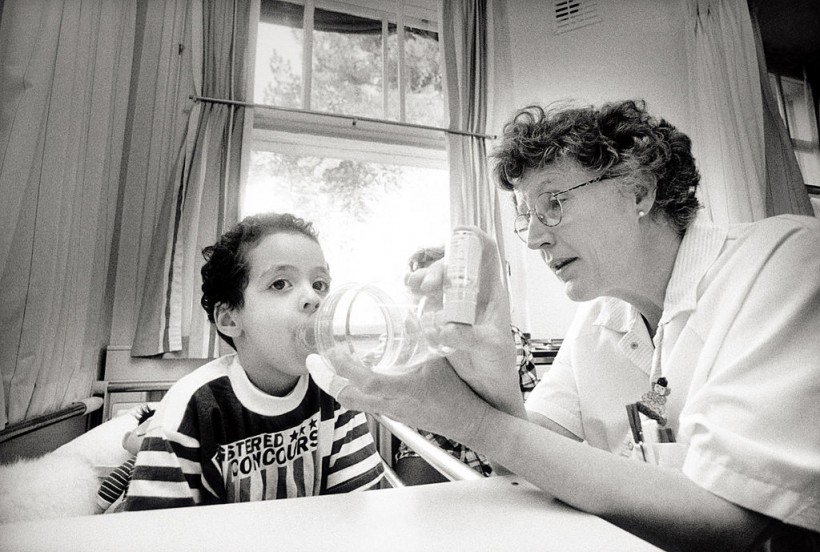Another day, another lousy attempt at COVID-19 treatment. It's inhaling hydrogen peroxide this time. As a result, the Asthma and Allergy Foundation of America (AAFA) issued a statement this week cautioning people about a "concerning and hazardous trend" circulating on social media.
According to the AAFA, some people are "breathing in hydrogen peroxide using nebulizers to try to prevent or cure COVID-19." Nebulizers are tiny machines that convert fast-acting liquid asthma medicine into a fine mist that individuals with asthma may inhale easily using a mouthpiece or mask.
The American Academy of Family Physicians advises against inhaling hydrogen peroxide, an antibacterial and bleaching chemical. AAFA urged the patients not to breathe in hydrogen peroxide through their nebulizer. The foundation said it's dangerous to health. According to AAFA, inhaling hydrogen peroxide will not only fail to prevent or treat COVID-19, but it will also put the patients' health at risk.
Inhaling Hydrogen Peroxide to Cure COVID-19? Not True!
The usage of hydrogen peroxide in a nebulizer to treat COVID-19 has been discussed on the internet.
The video suggests purchasing a nebulizer and using it for "10-15 minutes per hour" to nebulize a "3% Hydrogen Peroxide" mixed 50/50 with saline water.
The technique is marketed as a home cure for COVID-19 and the common cold, flu, and pneumonia. For individuals who have contracted COVID-19, seeking medical care and consulting with medical specialists is always recommended.
The Centers for Disease Control and Prevention (CDC) in the United States does not recommend hydrogen peroxide as a COVID-19 therapy.
Use of Hydrogen Peroxide
Hydrogen peroxide is a common home chemical that may be found in a wide range of items. As an active component, Hydrogen peroxide can be used as teeth whitening products and remove fabric stain removers. As the Cleveland Clinic notes, it may also be used as a disinfectant (in cleaning solutions for bathrooms and other surfaces since it eliminates germs, including bacteria and viruses. According to the Cleveland Clinic, hydrogen peroxide has long been used as an antiseptic for minor cuts and scrapes. Still, some doctors now advise against it since it may be highly abrasive to the wound.

UNDATED: In this undated image a child is helped with an asthma inhaler. A report released on May 3, 2005, to mark World Asthma Day claims that one person dies from asthma every hour in Western Europe.
However, the dangers of misusing hydrogen peroxide extend beyond aggravating a wound, especially if it goes into your airways. According to the US Department of Health and Human Services Agency for Toxic Substances and Disease Registry (ATSDR), inhaling household-grade hydrogen peroxide (3%) can cause respiratory discomfort. According to the ATSDR, it can also irritate the skin and eyes. Inhaling stronger industrial-grade solutions at concentrations higher than 10% can cause "severe lung discomfort," ATSDR added.
It's crucial to remember that the ATSDR only discusses unintentional hydrogen peroxide exposure, such as breathing it in while cleaning or on the job. Inhaling it deeply and directly using a nebulizer-a device designed to swiftly disseminate a drug into your airways and lungs through a tiny mist-would be a far more direct and dangerous type of exposure.
Furthermore, swallowing any strength of hydrogen peroxide solution-which one might easily do if using a nebulizer-is hazardous. According to the ASTR, ingesting lower household quantities might cause symptoms such as vomiting and gastrointestinal discomfort, as well as gastrointestinal embolisms (when air bubbles block blood arteries). Tissue scorching, loss of consciousness, and respiratory paralysis are all possible side effects of higher industrial-strength treatments.
The moral of the story is this: Keep your hydrogen peroxide away from your lungs and only use it to clean surfaces!
RELATED ARTICLE: COVID-19 Anosmia Cure: Vitamin A Nasal Spray, Drops Could Help You Get Back Your Sense of Smell
Check out more news and information on COVID-19 in Science Times.










!['Cosmic Glitch' in Einstein's Theory of General Relativity Could Be Explained in This New Scientific Tweak [Study]](https://1721181113.rsc.cdn77.org/data/thumbs/full/53435/258/146/50/40/cosmic-glitch-in-einsteins-theory-of-general-relativity-could-be-explained-in-this-new-scientific-tweak-study.jpeg)



